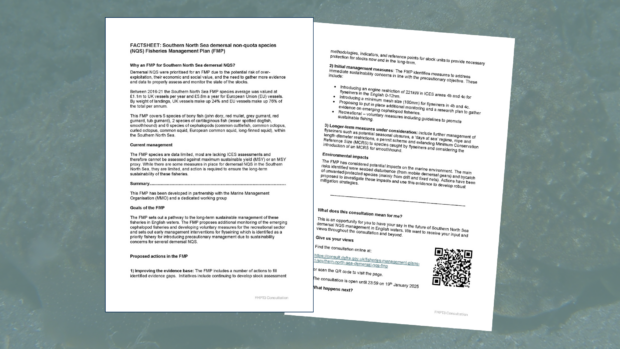https://defrafmp.blog.gov.uk/factsheet-southern-north-sea-demersal-non-quota-species-fisheries-management-plan-fmp/
FACTSHEET: Southern North Sea demersal non-quota species Fisheries Management Plan (FMP)
Why an FMP for Southern North Sea demersal non-quota species (NQS)?
Demersal NQS were prioritised for an FMP due to the potential risk of over-exploitation, their economic and social value, and the need to gather more evidence and data to properly assess and monitor the state of the stocks.
Between 2016-21 the Southern North Sea FMP species average was valued at £1.1m to UK vessels per year and £5.8m a year for European Union (EU) vessels. By weight of landings, UK vessels make up 24% and EU vessels make up 76% of the total per annum.
This FMP covers 5 species of bony fish (john dory, red mullet, grey gurnard, red gurnard, tub gurnard), 2 species of cartilaginous fish (lesser spotted dogfish, smoothhound) and 6 species of cephalopods (common cuttlefish, common octopus, curled octopus, common squid, European common squid, long-finned squid), within the Southern North Sea.
Current management
The FMP species are data limited, most are lacking ICES assessments and therefore cannot be assessed against maximum sustainable yield (MSY) or an MSY proxy. While there are some measures in place for demersal NQS in the Southern North Sea, they are limited, and action is required to ensure the long-term sustainability of these fisheries.
Summary
This FMP has been developed in partnership with the Marine Management Organisation (MMO) and a dedicated working group.
Goals of the FMP
The FMP sets out a pathway to the long-term sustainable management of these fisheries in English waters. The FMP proposes additional monitoring of the emerging cephalopod fisheries and developing voluntary measures for the recreational sector and sets out early management interventions for flyseining which is identified as a priority fishery for introducing precautionary management due to sustainability concerns for several demersal NQS.
Proposed actions in the FMP
1) Improving the evidence base: The FMP includes a number of actions to fill identified evidence gaps. Initiatives include continuing to develop stock assessment methodologies, indicators, and reference points for stock units to provide necessary protection for stocks now and in the long-term.
2) Initial management measures: The FMP identifies measures to address immediate sustainability concerns in line with the precautionary objective. These include:
- Introducing an engine restriction of 221kW in ICES areas 4b and 4c for flyseiners in the English 0-12nm.
- Introducing a minimum mesh size (100mm) for flyseiners in 4b and 4c.
- Proposing to put in place additional monitoring and a research plan to gather evidence on emerging cephalopod fisheries.
- Recreational – voluntary measures including guidelines to promote sustainable fishing.
3) Longer-term measures under consideration: include further management of flyseiners such as potential seasonal closures, a ‘days at sea’ regime, rope and length diameter restrictions, a permit scheme and extending Minimum Conservation Reference Size (MCRS) to species caught by flyseiners and considering the introduction of an MCRS for smoothhound.
Environmental impacts
The FMP has considered potential impacts on the marine environment. The main risks identified were seabed disturbance (from mobile demersal gears) and bycatch of unwanted/protected species (mainly from drift and fixed nets). Actions have been proposed to investigate these impacts and use this evidence to develop robust mitigation strategies.
What does this consultation mean for me?
This is an opportunity for you to have your say in the future of Southern North Sea demersal NQS management in English waters. We want to receive your input and views throughout the consultation and beyond.
Give us your views
Find the consultation online at: https://consult.defra.gov.uk/fisheries-management-plans-1/southern-north-sea-demersal-nqs-fmp
The consultation is open until 23:59 on 19 January 2025.
What happens next?
Your feedback will be analysed and considered as part of the consultation process.
Following this the Southern North Sea demersal NQS FMP will be updated.
The aim is to have the final FMP published as soon as possible in 2025.
For a printable version of this factsheet please contact FMPs@defra.gov.uk

